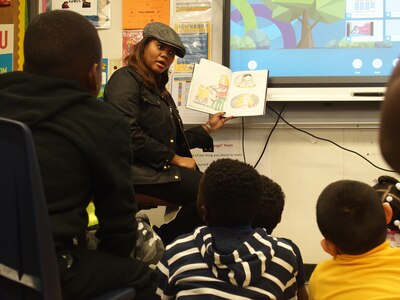Marnice DeShay thinks a lot of intervention needs to happen before Memphis students are held back for not reading on grade level. But her sister, Dianesia DeShay, says passing along children who are struggling in school does more harm than good, explaining, “Don’t send them on and they’re not ready.”
The siblings, both parents at Gardenview Elementary School, embody the debate over whether Shelby County Schools should hold back second-graders who are not reading proficiently. Both women, who earlier this year attended a parents meeting about a districtwide second-grade reading retention policy, agreed the district should do more to identify students who are behind in reading.
Literacy is the single biggest challenge facing the district, said Superintendent Joris Ray. “That’s why we’ve put in the 3rd Grade Commitment,” Ray told reporters on the first day of school. “If your child isn’t reading by third grade, it’s very difficult for them to succeed.”
The policy takes effect during the 2021-22 school year, which gives Shelby County Schools about two years to bolster its literacy efforts and educate the community on the changes to come. This year’s kindergarten students will be the first class of second graders to be impacted by the new policy, which could hold back students with lagging literacy skills.
Here’s what else you need to know about it.
Are most Memphis students reading at grade level?
Not according to the results of the 2019 state test, TNReady. This spring, about 24% of third graders in Shelby County Schools scored proficient in reading — at least six percentage points below the school system’s goal and down from 27% last year. That means about 6,200 of those Memphis students did not meet state requirements for reading. Ultimately, the district wants 90% of third-grade students reading proficiently by 2025. (Scroll to the bottom of this story for a searchable database of 2019 third-grade proficiency rates for each school in the district.)
Third-grade students statewide aren’t faring much better. About 37% of students across Tennessee’s nearly 150 districts met the tougher English Language Arts requirements put in place in 2017. Nine districts posted lower reading scores than did Shelby County Schools. In the state-run Achievement School District, which takes over low-performing schools, most of which are in Memphis, test results showed that just 5.6% of third-graders are reading proficiently.
On national exams this year, Shelby County Schools fourth-grade students ranked below average in reading when compared to 26 other urban districts.

Miska Clay Bibbs, the school board’s chairwoman, said she thinks the low proficiency rates have something to do with the rise of high-stakes testing. It has caused educators to lose sight of the basics, she said. “Teachers have to focus on that end result rather than the whole child,” she said after a reading event at her alma mater, Newberry Elementary, where about 19% of third-grade students are reading proficiently.
Does that mean most second graders in the district will be held back?
It’s unclear, but state tests results will play only a small role in the decision. State-required testing begins in third grade, but some districts, including Shelby County Schools, choose to administer an optional state test in second grade.
How does the retention policy work?
The criteria are below.
Shelby County Schools will require eight out of 12 possible points to promote students to third grade
Note: Mastery Connect helps teachers see what concepts students aren’t grasping and respond by giving more individualized instruction. Lexile is a national measure that converts a student’s reading ability into a number.
Students with disabilities and English language learners have their own goals for grade promotion and will not be evaluated under this policy, said Antonio Burt, the district’s chief academic officer.
What is the district doing to improve reading proficiency?
Retention is not the only strategy the district is employing to get more students reading on grade level. Shelby County Schools spent millions of dollars this year implementing student supports such as a new phonics curriculum, and hiring 56 teacher assistants for second-grade classrooms in schools where less than 25% of students meet state reading requirements.
Additionally, kindergarten and first-grade students have 45 minutes per day this year dedicated to working on areas students are struggling. That will help them catch up faster, district leaders said.
Statewide, officials have looked to strengthen teaching in kindergarten through second grade, especially since state research shows principals tend to concentrate their weakest teachers in those early grades that are free from high-stakes tests. Yet when it comes to learning foundational reading skills, those grade levels are crucial.
Without strong reading skills in early grades, the rest of the student’s education can be an uphill battle. A student who is not reading on grade level by third grade is four times more likely to drop out of school, according to 2012 research from the Annie E. Casey Foundation. District officials often say it’s not a coincidence that nearly the same percentage of students who read on grade level in third grade also are considered college-ready on the ACT college entrance exam.

How will the district communicate with families about their child’s progress — and the likelihood of being held back?
Parents of second-grade students in the 2021-22 school year will get updates on report cards on how their child is doing and will be notified by Feb. 1 if their child is in danger of being held back. Parents can appeal their child’s retention.
And as of this year, parents of kindergarten students will begin getting more detailed progress reports on reading skills so “parents will never be surprised in regards to where their kid is standing in relation to these criteria,” Burt, the chief academic officer, told parents at a community meeting this summer.
Parents can also go on the district’s website for information on how to help their children build their vocabulary and reading skills. District leaders have launched a bedtime story series on YouTube. They have also started to meet parents at tailgates and community events — handing out books and promoting literacy tools they can use at home.
Related: Why one Memphis principal reads bedtime stories to students via Facebook Live
Burt also promised parents to continue to host regular meetings about the new policy, and how they can support their child’s reading skills.
Ultimately, parents like Candace Marshall don’t want to have to fight school officials to make sure their child gets what they need.
“I don’t want her to be a statistic,” Marshall said.
How can parents find out how their child’s school is faring?
Below is a searchable chart of third-grade reading proficiency rates at each elementary school in Shelby County Schools for the past three years. Charter schools are included in the chart, but are not affected by the district’s retention policy. The state does not provide test data on schools that have fewer than 5% or greater than 95% proficiency to protect student privacy. Those scores are redacted.

This article tackles a topic raised during our 2019 Listening Tour. Read more about the 2019 Listening Tour here, and see more stories inspired by community input here.

